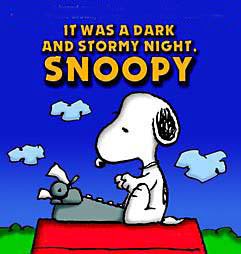
It was a dark and stormy night. Suddenly, a shot rang out! A door slammed. The maid screamed. Suddenly, a pirate ship appeared on the horizon! While millions of people were starving, the king lived in luxury. Meanwhile, on a small farm in Kansas, a boy was growing up.
This schmaltzy bit of “literature,” familiar to any die-hard Peanuts fan, came from the typewriter of that lovable beagle, Snoopy. In fact, Snoopy, in his eternal quest to write the great American novel, was inspired by Sir Edward Bulwer-Lytton, a 19th century British author who also wrote exceptionally bad prose. His famous – or perhaps infamous – crime novel Paul Clifford begins in very much the same way.
It was a dark and stormy night; the rain fell in torrents -- except at occasional intervals, when it was checked by a violent gust of wind which swept up the streets (for it is in London that our scene lies), rattling along the housetops, and fiercely agitating the scanty flame of the lamps that struggled against the darkness.
Since 1982 the English department at San Jose State University has held an annual contest and challenged writers to create something equally bad. An entry can be only one sentence, but can contain as many words as the writer dares. Dan McKay of Fargo, North Dakota won the 2005 contest with this entry.
As he stared at her ample bosom, he daydreamed of the dual Stromberg carburetors in his vintage Triumph Spitfire, highly functional yet pleasingly formed, perched prominently on top of the intake manifold, aching for experienced hands, the small knurled caps of the oil dampeners begging to be inspected and adjusted as described in chapter seven of the shop manual.
I find it exceedingly ironic that the man who is satirized yearly and plagiarized by a beagle is the same man who wrote the words “the pen is mightier than the sword.”
As writers, we have the opportunity to touch people with our words. We can evoke a plethora of emotions, incite laughter or reduce a reader to tears. Words alone are merely patterns of letters. But paired with a good plot, a great hero and heroine and a picturesque setting, these patterns of letters take on new meaning and deliver a message that is the writer’s own. They become powerful. And it is important to use that power wisely.
I read a blog entry recently that contained 287 words. 27 of those – nearly 10% -- were that word that rhymes with witch (or some variation thereof). I’ve been known to use that word on occasion but it’s not a regular part of my vocabulary. I certainly don’t use it 10% of the time. Call me old-fashioned, call me a prude, but that 287-word missive held no value whatsoever. In my opinion, it was a waste of words. A waste of that writer's power.
Here’s my challenge to you: how much power can you create with words in the next 24 hours? It can be as simple as a note that reads “I love you!” tucked into a child’s school lunch or as compelling as a long-overdue apology. Look up an old classmate and renew the friendship. Send a thank-you note to someone who has done something special for you. Write a note to a shut-in. Use your imagination. You'll think of something.
I heard a romance author talk about receiving a fan letter that said “Your book got me through chemotherapy today.” Now THAT’S the power of words.
1 comment:
I don't have to write the Great American Novel--I'd settle for a good book that someone else wanted to read (and better yet, pay me for).
I don't want to write like Snoopy, but I hope to do the Snoopy dance when I get The Call
Post a Comment